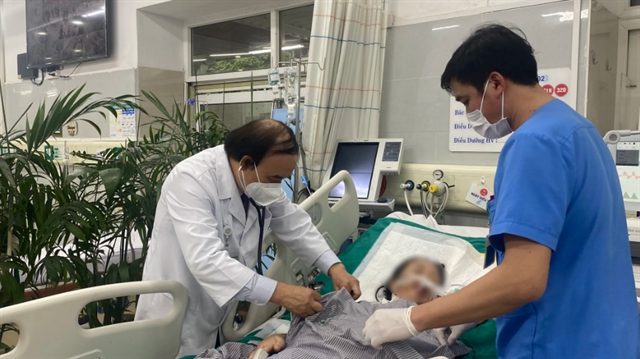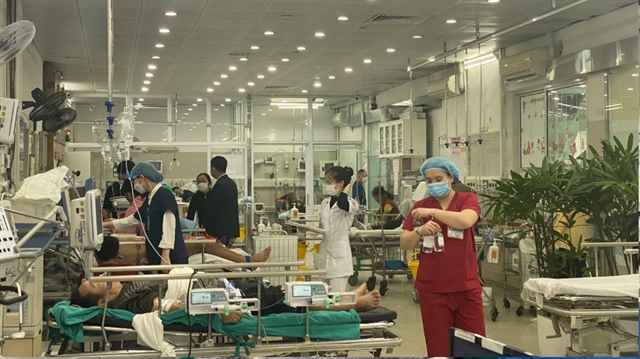 Society
Society


|
| Dr Nguyễn Văn Chi (left) and his colleague at the Emergency Centre in Bạch Mai Hospital, one of the leading hospitals in Việt Nam. Photo nhandan.vn |
Working at the A9 Emergency Centre in Bạch Mai Hospital in Hà Nội, Dr Nguyễn Văn Chi never allows himself a single day's rest. He contributes 24/7 to emergency services, especially during COVID-19.
In a recent interview with the daily newspaper Nhân Dân (The People), Dr Chi talks about his dream to elevate the emergency system so more people can be treated even before they come to the hospital.
What keeps you in this emergency centre of A9, when many private medical centres offer you higher salaries?
Doctors in A9 always have an extraordinary capability to work. They can work 24/24 without sleeping. We are always recognised as a strong team by the Ministry of Health and our fellow colleagues. Almost everyone here is resident doctor, very creative and intelligent.
Of decades working here, my only ambition is to do clinical or specialist, never to move out of my job or hospital. Bạch Mai is like my second home. When experiencing challenges, I always try hard to overcome them, always know how to set goals, build a roadmap and persistently strive for that goal. I face difficulties fiercely, calmly overcome them, and never give up.
It takes a great deal of time if you want to work with emergency services. Even when you have done excellently during the residence, it still takes you five years after graduation to be a main-duty doctor.
Most of the patients in A9 are in critical condition. We have to do it in the nick of time, with huge numbers of patients, and their time and chance to live all depend on us. We also have to talk to their families well, so they are calm and willing to cooperate with doctors. They need to know that the nature of emergency services is to save the more critical first, not the one who comes here first, so they would never ask similar questions.
Therefore, if you don’t sacrifice, if you don’t contribute, it is hard for you to stay, especially in big emergency centres like A9. I am really proud of the doctors in A9. Even when we are under a lot of pressure, we always work with full passion and responsibility. Never a single time do we show stress or unwillingness, and we are always proud to be a doctor in A9 Bạch Mai.
I am used to this high volume of working and studying every day and night for decades. I have a lot of passion to pass on to the next generations to contribute more to emergency services. That’s why, despite having a lot of job invitations, I am still here, in A9 Emergency Centre.
It could be seen during COVID-19 that the healthcare system couldn’t provide good services in quantity and quality simultaneously. Do you think that is true as someone who works in emergency services during the pandemic?
COVID-19 was a nice test for our medical system to know if we can adapt to an abnormal situation. We always tried our best during the pandemic, but we had difficulties similar to any medical system worldwide. At the centre of the pandemic, we lacked doctors, medical equipment and facilities to deal with COVID-19, like some developed countries.
At the peak from July to October 2021 in HCM City, we could clearly see the shortages. It only could be solved with the support of Bạch Mai Hospital and the few hospitals in other provinces. After the peak in HCM City, we have a few more in some southwest provinces, which have very insufficient medical resources, especially in emergencies. We lack quality and quantity, with few doctors who can do emergency.
In whatever situation, we are at Bạch Mai, always the nation’s terminal hospital. We always do our own duty to support lower-line hospitals. A9 Emergency Centre always initiated the fight against COVID-19, providing resources to Đà Nẵng, Hải Dương, Chí Linh, Bắc Ninh, Bắc Giang, Vĩnh Phúc, Điện Biên, Tây Nguyên, HCM City and the southwest provinces. We have contributed hugely to the Vietnamese success in tackling COVID-19.
Does the effectiveness of technology transfer help the big hospital to offload and enhance the patient’s trust in local medical services?
Our medical system has developed rapidly in the last decade, and in some areas, we arrived at the same level as some developed countries’ health systems. Up to now, many highly specialised techniques such as airway interventions, hemodynamics, dialysis, and hypothermia have been transferred to the lower level, many patients are treated promptly without having to be transferred. Supporting the lower level is to help people and partly to help Bạch Mai Hospital not be overloaded.
I always told my colleagues in the downline: “When you transfer a patient, you transfer the patient's trust. If you do well with your profession and techniques for the patient, of course, you will have your patient's trust." And, with many technical processes and our regular online support, it has helped the lower level to treat serious patients and provide confidence to treat them. Confidence for doctors is very important. You can’t overcome everything without being confident.

|
| Doctors work against the clock to save lives in the Emergency Centre. Photo nhandan.vn |
A good health system is a system that treats patients before they come to the hospital. Do we still struggle to find the answer to “When can Việt Nam have a strong outpatient emergency system?”
A good medical system treats patients even before they come to the hospital. They help people have basic health knowledge, a healthy routine, and regular health checks. Our outpatient system is still very small; compared to the other countries, we almost have none. When patients experience health problems, the fastest way is for family to bring them to the hospital because waiting for the emergency transport unit is very difficult. Therefore, from the time of health instability until reaching the hospital, the patient has lost valuable time in health care.
The outpatient emergency service is something that needs attention. We, the emergency industry, alongside the Ministry of Health, have made great efforts to build but so far it has not been fully developed. We need a policy mechanism to attract high-quality human resources, creating good opportunities for the development of pre-hospital emergencies. — VNS




